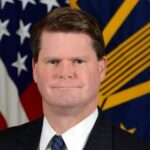As part of NSI’s ongoing series, “A Spotlight on China’s Global Repression,” we were excited to host a discussion examining how China uses economic tools, such as the Belt-and-Road Initiative, foreign direct investment, and debt diplomacy, to further the Chinese Communist Party’s repressive goals. Experts outlined the dangers these pose inside and outside China and how the U.S. can counter these global threats.
Participants:
- Matthew P. Goodman, Senior Vice President for Economics, Center for Strategic and International Studies
- The Honorable Nazak Nakakhtar, Former Assistant Secretary for Industry & Analysis, Department of Commerce
- The Honorable Randall G. Schriver, Former Assistant Secretary of Defense for Indo-Pacific
- Lester Munson (moderator), Former Staff Director, Senate Foreign Relations Committee
About Our Speakers:
 Matthew P. Goodman is senior vice president for economics and holds the Simon Chair in Political Economy at CSIS. The CSIS Economics Program, which he directs, focuses on international economic policy and global economic governance. Before joining CSIS in 2012, Goodman served as director for international economics on the National Security Council staff, helping the president prepare for global and regional summits, including the G20, Asia-Pacific Economic Cooperation (APEC), and East Asia Summit. Prior to the White House, Goodman was senior adviser to the undersecretary for economic affairs at the U.S. Department of State. Before joining the Obama administration in 2009, he worked for five years at Albright Stonebridge Group, where he was managing director for Asia. From 2002 to 2004, he served at the White House as director for Asian economic affairs on the National Security Council staff. Prior to that, he spent five years at Goldman, Sachs & Co., heading the bank’s government affairs operations in Tokyo and London. From 1988 to 1997, he worked as an international economist at the U.S. Treasury Department, including five years as financial attaché at the U.S. embassy in Tokyo. Goodman holds an M.A. in international relations from the Johns Hopkins School of Advanced International Studies (SAIS) and a B.Sc. in economics from the London School of Economics and Political Science (LSE). He is a life member of the Council on Foreign Relations and chairman emeritus of the board of trustees of the Japan-America Society of Washington, D.C.
Matthew P. Goodman is senior vice president for economics and holds the Simon Chair in Political Economy at CSIS. The CSIS Economics Program, which he directs, focuses on international economic policy and global economic governance. Before joining CSIS in 2012, Goodman served as director for international economics on the National Security Council staff, helping the president prepare for global and regional summits, including the G20, Asia-Pacific Economic Cooperation (APEC), and East Asia Summit. Prior to the White House, Goodman was senior adviser to the undersecretary for economic affairs at the U.S. Department of State. Before joining the Obama administration in 2009, he worked for five years at Albright Stonebridge Group, where he was managing director for Asia. From 2002 to 2004, he served at the White House as director for Asian economic affairs on the National Security Council staff. Prior to that, he spent five years at Goldman, Sachs & Co., heading the bank’s government affairs operations in Tokyo and London. From 1988 to 1997, he worked as an international economist at the U.S. Treasury Department, including five years as financial attaché at the U.S. embassy in Tokyo. Goodman holds an M.A. in international relations from the Johns Hopkins School of Advanced International Studies (SAIS) and a B.Sc. in economics from the London School of Economics and Political Science (LSE). He is a life member of the Council on Foreign Relations and chairman emeritus of the board of trustees of the Japan-America Society of Washington, D.C.
 The Honorable Nazak Nakakhtar brings over two decades of experience in international trade and national security to help clients succeed in the domestic and global marketplace. Through leadership roles in the U.S. government and private sector, Nazak has leveraged her valuable insights into the expansive range of U.S. and international laws, regulatory and policy processes, and federal agency resources to achieve clients’ business objectives. From 2018 to 2021, with unanimous confirmation by the U.S. Senate, Nazak served as the Department of Commerce’s Assistant Secretary for Industry & Analysis at the International Trade Administration (ITA). Nazak also fulfilled the duties of the Under Secretary for Industry and Security at Commerce’s Bureau of Industry and Security (BIS). In these roles, Nazak was the agency’s primary liaison with U.S. industry and trade associations, and she shaped major initiatives to strengthen U.S. industry competitiveness, promote innovation, and accelerate economic and job growth. As one of the key national security experts in the U.S. government, she developed and implemented innovative laws, regulations, and policies to safeguard strategically important technologies, strengthen the U.S. industrial base, and protect the national security and foreign policy interests of the United States. As the Department’s lead on the Committee on Foreign Investment in the United States (CFIUS), she played a key role in shaping U.S. investment policy. As the head of the agency’s trade policy office, she advised the U.S. government on legal and economic issues impacting critical technologies, advanced manufacturing, financial services, e-commerce, data privacy, cybersecurity, critical minerals/rare earths, and energy competition. Finally, as the federal agency’s lead on supply chain assessments, Nazak spearheaded the United States’ first-ever whole-of-government initiative to evaluate and strengthen supply chains across all strategic sectors of the economy.
The Honorable Nazak Nakakhtar brings over two decades of experience in international trade and national security to help clients succeed in the domestic and global marketplace. Through leadership roles in the U.S. government and private sector, Nazak has leveraged her valuable insights into the expansive range of U.S. and international laws, regulatory and policy processes, and federal agency resources to achieve clients’ business objectives. From 2018 to 2021, with unanimous confirmation by the U.S. Senate, Nazak served as the Department of Commerce’s Assistant Secretary for Industry & Analysis at the International Trade Administration (ITA). Nazak also fulfilled the duties of the Under Secretary for Industry and Security at Commerce’s Bureau of Industry and Security (BIS). In these roles, Nazak was the agency’s primary liaison with U.S. industry and trade associations, and she shaped major initiatives to strengthen U.S. industry competitiveness, promote innovation, and accelerate economic and job growth. As one of the key national security experts in the U.S. government, she developed and implemented innovative laws, regulations, and policies to safeguard strategically important technologies, strengthen the U.S. industrial base, and protect the national security and foreign policy interests of the United States. As the Department’s lead on the Committee on Foreign Investment in the United States (CFIUS), she played a key role in shaping U.S. investment policy. As the head of the agency’s trade policy office, she advised the U.S. government on legal and economic issues impacting critical technologies, advanced manufacturing, financial services, e-commerce, data privacy, cybersecurity, critical minerals/rare earths, and energy competition. Finally, as the federal agency’s lead on supply chain assessments, Nazak spearheaded the United States’ first-ever whole-of-government initiative to evaluate and strengthen supply chains across all strategic sectors of the economy.
 The Honorable Randall G. Schriver is Chairman of the Board at The Project 2049 Institute. In addition, Mr. Schriver is currently a partner at Pacific Solutions LLC. Most recently, Mr. Schriver served as the Assistant Secretary of Defense for Indo-Pacific Security Affairs from 8 January 2018 to 31 December 2019. Prior to his confirmation as Assistant Secretary, Mr. Schriver was a founding partner of Armitage International LLC, a consulting firm that specializes in international business development and strategies. He was also a founder of the Project 2049 Institute, and served as President and CEO. Previously, Mr. Schriver served as Deputy Assistant Secretary of State for East Asian and Pacific Affairs. From 2001 to 2003, he served as Chief of Staff and Senior Policy Advisor to the Deputy Secretary of State. From 1994 to 1998, he worked in the Office of the Secretary of Defense, including as the senior official responsible for the day-to-day management of U.S. bilateral relations with the People’s Liberation Army and the bilateral security and military relationships with Taiwan. Prior to his civilian service, he served as an active duty Navy Intelligence Officer from 1989 to 1991, including a deployment in support of Operation Desert Shield/Desert Storm. After active duty, he served in the Navy Reserves for nine years, including as Special Assistant to the Chairman of the Joint Chiefs of Staff and an attaché at U.S. Embassy Beijing and U.S. Embassy Ulaanbaatar. Mr. Schriver has won numerous military and civilian awards from the U.S. government and was presented while at the State Department with the Order of the Propitious Clouds by the President of Taiwan for service promoting U.S.-Taiwan relations. Mr. Schriver received a Bachelor of Arts degree in history from Williams College and a Master of Arts degree from Harvard University.
The Honorable Randall G. Schriver is Chairman of the Board at The Project 2049 Institute. In addition, Mr. Schriver is currently a partner at Pacific Solutions LLC. Most recently, Mr. Schriver served as the Assistant Secretary of Defense for Indo-Pacific Security Affairs from 8 January 2018 to 31 December 2019. Prior to his confirmation as Assistant Secretary, Mr. Schriver was a founding partner of Armitage International LLC, a consulting firm that specializes in international business development and strategies. He was also a founder of the Project 2049 Institute, and served as President and CEO. Previously, Mr. Schriver served as Deputy Assistant Secretary of State for East Asian and Pacific Affairs. From 2001 to 2003, he served as Chief of Staff and Senior Policy Advisor to the Deputy Secretary of State. From 1994 to 1998, he worked in the Office of the Secretary of Defense, including as the senior official responsible for the day-to-day management of U.S. bilateral relations with the People’s Liberation Army and the bilateral security and military relationships with Taiwan. Prior to his civilian service, he served as an active duty Navy Intelligence Officer from 1989 to 1991, including a deployment in support of Operation Desert Shield/Desert Storm. After active duty, he served in the Navy Reserves for nine years, including as Special Assistant to the Chairman of the Joint Chiefs of Staff and an attaché at U.S. Embassy Beijing and U.S. Embassy Ulaanbaatar. Mr. Schriver has won numerous military and civilian awards from the U.S. government and was presented while at the State Department with the Order of the Propitious Clouds by the President of Taiwan for service promoting U.S.-Taiwan relations. Mr. Schriver received a Bachelor of Arts degree in history from Williams College and a Master of Arts degree from Harvard University.
 Lester Munson (moderator) is an NSI Senior FellowVice President, International at BGR Group, a leading government relations firm in Washington, DC, where he consults with foreign governments, corporations, and advocacy groups. He also serves as adjunct faculty at Johns Hopkins University and as a principal on the Modernizing Foreign Assistance Network. He speaks regularly on the foreign policy role of Congress and on U.S. foreign assistance issues. Most recently, he is co-author of the Atlantic Council’s “State Department Reform Report,” released in August 2017, and the Center for Strategic and International Studies’ “Reforming and Reorganizing U.S. Foreign Assistance,” released in June. Lester joined BGR Group in November 2015 after a 26-year career on Capitol Hill and in the Executive Branch. He was most recently Staff Director of the Senate Foreign Relations Committee, where he led policy, oversight, legislative, and communications efforts for a staff of 25 and negotiated committee priorities with the White House, the State Department, and Congressional leadership. Previously, Lester was Chief of Staff for Senator Mark Kirk of Illinois. During his tenure, Senator Kirk became the leading Republican voice in the Senate on Iran and other national security issues. During the Bush Administration, Lester served as Deputy Assistant Administrator at the U.S. Agency for International Development, where he focused on legislative affairs as well as global health issues. He led legislative efforts to develop and implement the President’s Emergency Plan for AIDS Relief (PEPFAR) and won an award for his contribution to the creation of the President’s Malaria Initiative. Lester is a 1989 graduate of the University of Chicago and holds a Master’s degree from St. John’s College in Annapolis. He is married with two children.
Lester Munson (moderator) is an NSI Senior FellowVice President, International at BGR Group, a leading government relations firm in Washington, DC, where he consults with foreign governments, corporations, and advocacy groups. He also serves as adjunct faculty at Johns Hopkins University and as a principal on the Modernizing Foreign Assistance Network. He speaks regularly on the foreign policy role of Congress and on U.S. foreign assistance issues. Most recently, he is co-author of the Atlantic Council’s “State Department Reform Report,” released in August 2017, and the Center for Strategic and International Studies’ “Reforming and Reorganizing U.S. Foreign Assistance,” released in June. Lester joined BGR Group in November 2015 after a 26-year career on Capitol Hill and in the Executive Branch. He was most recently Staff Director of the Senate Foreign Relations Committee, where he led policy, oversight, legislative, and communications efforts for a staff of 25 and negotiated committee priorities with the White House, the State Department, and Congressional leadership. Previously, Lester was Chief of Staff for Senator Mark Kirk of Illinois. During his tenure, Senator Kirk became the leading Republican voice in the Senate on Iran and other national security issues. During the Bush Administration, Lester served as Deputy Assistant Administrator at the U.S. Agency for International Development, where he focused on legislative affairs as well as global health issues. He led legislative efforts to develop and implement the President’s Emergency Plan for AIDS Relief (PEPFAR) and won an award for his contribution to the creation of the President’s Malaria Initiative. Lester is a 1989 graduate of the University of Chicago and holds a Master’s degree from St. John’s College in Annapolis. He is married with two children.
Thank you to everyone that contributed to this important discussion.

